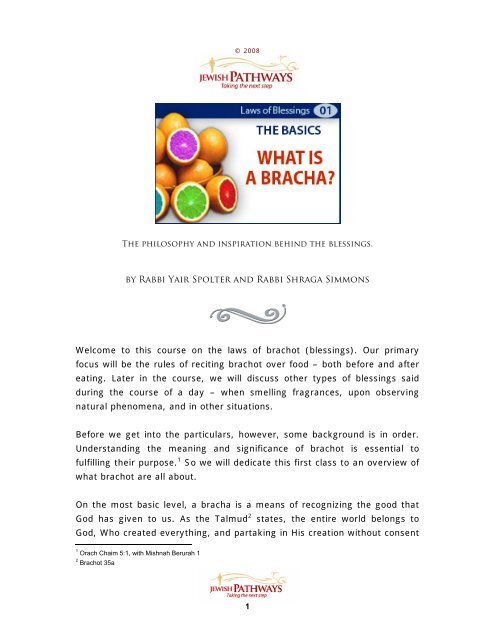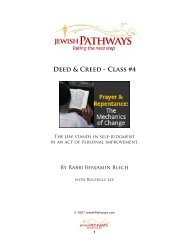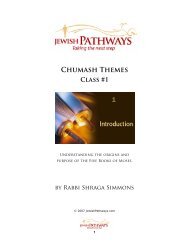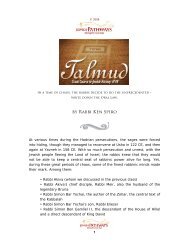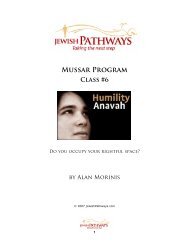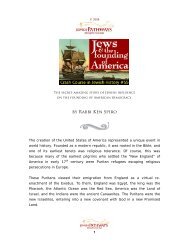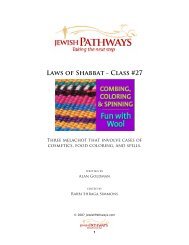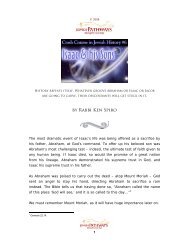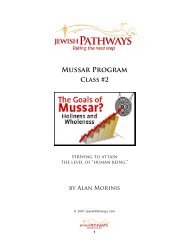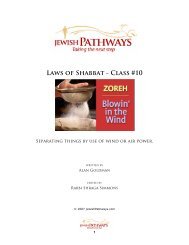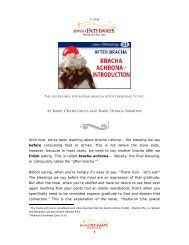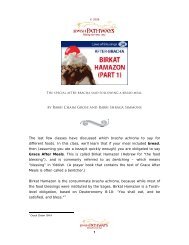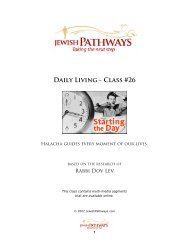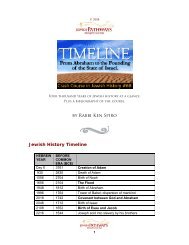What is a Bracha? - JewishPathways.com
What is a Bracha? - JewishPathways.com
What is a Bracha? - JewishPathways.com
You also want an ePaper? Increase the reach of your titles
YUMPU automatically turns print PDFs into web optimized ePapers that Google loves.
© 2008<br />
The philosophy and inspiration behind the blessings.<br />
by Rabbi Yair Spolter and Rabbi Shraga Simmons<br />
Wel<strong>com</strong>e to th<strong>is</strong> course on the laws of brachot (blessings). Our primary<br />
focus will be the rules of reciting brachot over food – both before and after<br />
eating. Later in the course, we will d<strong>is</strong>cuss other types of blessings said<br />
during the course of a day – when smelling fragrances, upon observing<br />
natural phenomena, and in other situations.<br />
Before we get into the particulars, however, some background <strong>is</strong> in order.<br />
Understanding the meaning and significance of brachot <strong>is</strong> essential to<br />
fulfilling their purpose. 1 So we will dedicate th<strong>is</strong> first class to an overview of<br />
what brachot are all about.<br />
On the most basic level, a bracha <strong>is</strong> a means of recognizing the good that<br />
God has given to us. As the Talmud 2 states, the entire world belongs to<br />
God, Who created everything, and partaking in H<strong>is</strong> creation without consent<br />
1<br />
Orach Chaim 5:1, with M<strong>is</strong>hnah Berurah 1<br />
2<br />
Brachot 35a<br />
1
would be tantamount to stealing. When we acknowledge that our food<br />
<strong>com</strong>es from God – i.e. we say a bracha – God grants us perm<strong>is</strong>sion to<br />
partake in the world's pleasures. Th<strong>is</strong> fulfills the purpose of ex<strong>is</strong>tence: To<br />
recognize God and <strong>com</strong>e close to Him.<br />
Once we have been satiated, we again bless God, expressing our<br />
appreciation for what He has given us. 3 So, first and foremost, a bracha <strong>is</strong> a<br />
“please” and a "thank you" to the Creator for the sustenance and pleasure<br />
He has bestowed upon us.<br />
The Midrash 4 relates that Abraham’s tent was pitched in the middle of an<br />
intercity highway, and open on all four sides so that any traveler was<br />
wel<strong>com</strong>e to a royal feast. Inevitably, at the end of the meal, the grateful<br />
guests would want to thank Abraham. “It’s not me who you should be<br />
thanking,” Abraham replied. “God provides our food, and sustains us<br />
moment by moment. To Him we should give thanks!” Those who balked at<br />
the idea of thanking God were offered an alternative: Pay full price for the<br />
meal. Considering the high price for a fabulous meal in the desert, Abraham<br />
succeeded in inspiring even the skeptics to “give God a try.”<br />
Source of All Blessing<br />
Yet the essence of a bracha goes beyond mere manners. Th<strong>is</strong> <strong>is</strong> evident<br />
from the text of the bracha itself. Every bracha begins with the phrase<br />
"Baruch Ata Ado-noy" – "Blessed are You, God." Th<strong>is</strong> expresses our will that<br />
God should be blessed.<br />
Many <strong>com</strong>mentators, however, take <strong>is</strong>sue with th<strong>is</strong> translation, because of<br />
its implicit philosophical difficulty. How can man bestow blessing upon God,<br />
Who <strong>is</strong> lacking nothing, Who created all ex<strong>is</strong>tence, and has infinite ability<br />
and power?! <strong>What</strong> could God possibly need from man, a mere creation? 5<br />
3<br />
Deuteronomy 8:10<br />
4<br />
Midrash Aggada (Genes<strong>is</strong> 21:33); see also Talmud - Sotah 10b; Midrash Tanchuma (Lech Lecha 12); Midrash Rabba<br />
(Genes<strong>is</strong> 54); Midrash Shochar Tov (Tehillim 110).<br />
5<br />
Sefer HaChinuch 430<br />
2
These <strong>com</strong>mentators therefore explain "Baruch Ata Ado-noy" as a<br />
statement of recognition: "You, God, are the Source of all blessing." 6 In th<strong>is</strong><br />
way, a bracha serves as a humbling reminder that it <strong>is</strong> not our “own<br />
strength that brought th<strong>is</strong> prosperity” (Deut. 8:17). Rather, we express our<br />
dependence on God, acknowledging that He <strong>is</strong> the source from which our<br />
good has <strong>com</strong>e. 7<br />
Th<strong>is</strong> concept <strong>is</strong> reflected in the word bracha which shares a root with the<br />
word berech, meaning "knee." 8 In reciting a bracha, we "bend our knees" to<br />
God, so to speak, bowing in recognition of our need for, and in our<br />
appreciation of, H<strong>is</strong> kindness.<br />
The Power of a <strong>Bracha</strong><br />
Another word that shares a <strong>com</strong>mon root<br />
with bracha <strong>is</strong> breicha, which means<br />
“wellspring.” 9 Th<strong>is</strong> alludes to the fact that<br />
reciting a bracha opens a wellspring of<br />
blessing that flows down from the<br />
heavens. Th<strong>is</strong> theme <strong>is</strong> hinted in the root<br />
letters of the word "bracha" – bet, re<strong>is</strong>h,<br />
chaf – whose numerical values are 2, 20 and 200. While the number one<br />
signifies the minimal amount of anything, two begins the series of<br />
multiplicity. The word bracha <strong>is</strong> made up of all the "two’s," hinting to the<br />
power of a bracha to bring additional good into the world. 10<br />
There <strong>is</strong> an interesting halacha that one should have bread on the table<br />
when reciting Birkat Hamazon (Grace After Meals). 11 One reason given for<br />
th<strong>is</strong> <strong>is</strong> that God's blessing always manifests itself on something that already<br />
ex<strong>is</strong>ts; if there would be no bread on the table, there would be no<br />
6<br />
Rebbeinu Bachya (Kad HaKemach – chapter “<strong>Bracha</strong>”)<br />
7<br />
See Michtav M’Eliyahu (vol. 3, pg. 273)<br />
8<br />
Sefer HaBahir – letter “Dalet”<br />
9<br />
Midrash Rabba (Genes<strong>is</strong> 39:11); Rabbeinu Bachya (Deut. 8:10)<br />
10<br />
Maharal (Tifferet Y<strong>is</strong>rael 34, Netzach Y<strong>is</strong>rael 45)<br />
11<br />
Orach Chaim 180:1<br />
3
"receptacle" for God's blessing. 12 So we see that even as we are reciting a<br />
bracha, we are simultaneously receiving God's blessing of increased<br />
prosperity. A bracha, therefore, <strong>is</strong> a key to open the flow of God's blessing<br />
into the world. 13<br />
In th<strong>is</strong> regard, one who neglects to say a bracha <strong>is</strong> considered as having<br />
stolen not only from God, but also from the Jew<strong>is</strong>h people, 14 and ultimately<br />
all of humanity, having denied them an opportunity to receive God's<br />
blessing.<br />
Partners with God<br />
The two concepts that we have d<strong>is</strong>cussed so far – recognizing God's<br />
kindness and bringing blessing into the world – are inter-related. Let’s<br />
explore th<strong>is</strong> connection a bit deeper:<br />
When God created the world, He put everything in place before creating<br />
man. The sun and the moon, fowl and f<strong>is</strong>h, animals and insects, and every<br />
living creature were all created before man. When Adam would finally arrive<br />
on the scene, he was to find a "set table" before him – a magnificent,<br />
fin<strong>is</strong>hed world. But the Torah tells us there was one thing that God saved<br />
for man to <strong>com</strong>plete.<br />
"Now all the trees of the field were not yet on the earth, and all the<br />
herb of the field had not yet sprouted, for God had not sent rain upon<br />
the earth, and there was no man to work the soil." (Genes<strong>is</strong> 2:5)<br />
The plant-life would have to wait, concealed under the surface of the<br />
ground, until the first rainfall. And why had it not rained? Because, the<br />
Midrash says, God wanted man to turn to Him and pray for rain. That way,<br />
when the rain fell, man would appreciate each and every drop as God's gift<br />
to the world. 15<br />
12<br />
Magen Avraham 180:1<br />
13<br />
Rabbeinu Bachya (Deut. 8:10)<br />
14<br />
Talmud – Brachot 35b<br />
15<br />
Midrash Aggada (Genes<strong>is</strong> 2:5)<br />
4
God created the world with the purpose of bringing man close to Him. So<br />
He created a system which requires the spiritual efforts of man. When we<br />
say a bracha, it <strong>is</strong> our recognition that we need God, and are indeed utterly<br />
dependent upon Him. Th<strong>is</strong> forges a meaningful relationship with God, brings<br />
us closer to Him – and opens up the gates of blessing. 16<br />
So it <strong>is</strong> the "Baruch Ata" – recognizing God as the source of blessing – that<br />
opens the "breicha," the wellspring of abundance, and <strong>com</strong>pletes the<br />
partnership between man and God that sustains the world.<br />
We can now understand how some <strong>com</strong>mentators explain the simple<br />
translation of the phrase Baruch Ata as "Blessed are You." Of course,<br />
everyone agrees that God does not need our blessing. However, in a sense<br />
it <strong>is</strong> man's job to prompt God, so to speak, to act with kindness and bring<br />
blessing into the world. "Baruch Ata Ado-noy – may You, God, allow<br />
Yourself to exerc<strong>is</strong>e Your power of goodness toward mankind.” 17<br />
Holy Sparks<br />
Understanding the meaning behind these blessings and the power they<br />
possess can transform the mundane act of eating into a deeply spiritual<br />
experience. Before biting into an apple, we thank God for making the apple,<br />
thus making the physical act of eating into a holy act. And in doing so, we<br />
elevate ourselves from the level of “animal behavior” to the unique and<br />
lofty level of “human being.” 18<br />
The Torah says: “Man does not live by bread alone, but rather on the word<br />
of God.” 19 The kabbal<strong>is</strong>ts cite th<strong>is</strong> verse to show that food <strong>is</strong> more than just<br />
16<br />
Rabbeinu Bachya (Deut. 8:10)<br />
17<br />
Th<strong>is</strong> helps us understand a perplexing Talmudic passage: Rabbi Y<strong>is</strong>hmael the High Priest was once in the Temple’s<br />
Holy of Holies, when He heard God say, "Y<strong>is</strong>hmael, my son, bless Me." Rabbi Y<strong>is</strong>hmael responded, "May it be Your will<br />
that Your attribute of mercy will suppress Your anger, and Your mercy should prevail over Your other attributes..."<br />
Certainly, God could have acted without Rabbi Y<strong>is</strong>hmael's request. But it <strong>is</strong> God's desire that H<strong>is</strong> kindness be prompted<br />
by man. Therefore, He said, "Bless Me!" (Brachot 7a)<br />
18<br />
see Way of God 4:9<br />
19<br />
Deut. 8:3<br />
5
nour<strong>is</strong>hment for the body. There are also "sparks of holiness" contained in<br />
food, and when we eat that food in an appropriate way (i.e. kosher food,<br />
and saying a bracha), the holiness in that food <strong>is</strong> unlocked and nour<strong>is</strong>hes<br />
the soul. Th<strong>is</strong> <strong>is</strong> crucial to our overall health, because “Man does not live by<br />
bread alone.” 20<br />
Just as food helps the soul connect to the body (because without food,<br />
eventually the soul will separate from the body), brachot connect the soul<br />
to the Infinite. The kabbal<strong>is</strong>ts explain that the mouth <strong>is</strong> where the soul<br />
fuses with the body, which <strong>is</strong> why food goes in there and why brachot are<br />
spoken there – as they maintain the soul's connection to the Infinite. 21<br />
A Life of Pra<strong>is</strong>e<br />
The material world presents us with two choices: to enjoy it as a gourmet<br />
(spiritually) or as a glutton (materially). To enjoy it only in itself, or to use<br />
the aesthetic experience to leap toward transcendental awareness. The<br />
bracha <strong>is</strong> a user-friendly method for elevating the aesthetic experience into<br />
the wow! that every moment of life can and should be. 22<br />
Maimonides codifies the laws of brachot with<br />
the mitzvot that bring one to love of God.<br />
Every blessing expresses our yearning to<br />
connect with God. A true story <strong>is</strong> told that<br />
illustrates th<strong>is</strong> idea:<br />
One time, a chassidic rebbe, Rabbi Aaron<br />
from Karlin, took an apple in h<strong>is</strong> hand, and<br />
h<strong>is</strong> student took an apple as well. Each of<br />
the men said a bracha and began to eat.<br />
When they were fin<strong>is</strong>hed, the rebbe said to h<strong>is</strong> student:<br />
20<br />
Sidduro Shel Shabbat 1:5, quoting the Arizal; Ruach HaChaim 3:3; M<strong>is</strong>hnah Berurah 6:6; see Birkat Dovid 34,<br />
quoting Pri Etz Hadar<br />
21<br />
Ibn Ezra (Psalms 135:16); Pitchei Halachot, Intro to Laws of Brachot 5, citing Intro to Besamim Rosh 18<br />
22<br />
Rabbi Alexander Seinfeld<br />
6
"Do you know the difference between you and me? You were hungry and<br />
wanted to eat an apple. But to do so, you first needed to say a bracha. In<br />
my case, I looked around at the beauty of our world and desperately<br />
wanted to call out in pra<strong>is</strong>e of God. Since our Sages made brachot the<br />
context to pra<strong>is</strong>e God, I needed to take an apple. In other words, you said a<br />
bracha to eat the apple, and I ate the apple to say a bracha!" 23<br />
Sefer Olat Tamid l<strong>is</strong>ts 13 verses that one fulfills each time one says a<br />
bracha properly. Included among them:<br />
• the mitzvah to remember God (Deut. 8:18)<br />
• recalling the kindness that God performs for us (Deut. 8:2)<br />
• being careful not to mention God's name in vain (Exodus 20:7)<br />
• trying to relate to God in all of our ways (Proverbs 3:6)<br />
To review, a bracha:<br />
• pra<strong>is</strong>es God as the source of all goodness<br />
• asks perm<strong>is</strong>sion to eat God’s food, and says "thank you"<br />
• brings God's blessing into the world<br />
About the Sources<br />
Th<strong>is</strong> course <strong>is</strong> intended to provide halachic principles and examples. There<br />
are many nuances to Jew<strong>is</strong>h law, and in actual practice one should consult<br />
with a local rabbi.<br />
Th<strong>is</strong> course follows these main source materials:<br />
• The Laws of B’rachos by Rabbi Binyomin Forst (ArtScroll)<br />
• Halachos of Brochos by Rabbi Y<strong>is</strong>roel Pinchos Bodner (Feldheim)<br />
• V’Zot Ha<strong>Bracha</strong> by Rabbi Alexander A. Mendelbaum (in Hebrew)<br />
23<br />
Kovetz Kol HaTorah 45, Ma’amerei Mussar, pg. 29<br />
7
• Principles of Hilchos Brachos by Rabbi Daniel Schloss, based on<br />
the lectures of Rabbi Yitzchak Berkovits, given at the A<strong>is</strong>h HaTorah<br />
yeshiva in Jerusalem<br />
For those who w<strong>is</strong>h to reference more primary sources, we provide<br />
footnotes throughout our lessons:<br />
• Shulchan Aruch (literally: "Set Table") <strong>is</strong> the main authoritative<br />
source of Jew<strong>is</strong>h law and custom, and hence simply referred to often<br />
as the “Code of Jew<strong>is</strong>h Law.” Written by Rabbi Yosef Karo in the 16th<br />
century, it <strong>is</strong> divided into four main sections; the laws of brachot are<br />
covered in the section Orach Chaim (abbreviated OC). Additional<br />
notes pertaining to Ashkenazi custom were added by the Rema –<br />
Rabbi Moshe Isserles (16th century Poland).<br />
• M<strong>is</strong>hnah Berurah <strong>is</strong> a 20th century Ashkenazi<br />
'update' of the Shulchan Aruch 'Orach Chaim'<br />
section, including the laws of brachot. It was<br />
authored by Rabbi Y<strong>is</strong>rael Meir Kagan, better<br />
known as the Chafetz Chaim, and includes h<strong>is</strong><br />
additional notes entitled Biur Halacha and Sha’ar<br />
Hatziyun. M<strong>is</strong>hnah Berurah <strong>is</strong> also available in<br />
Engl<strong>is</strong>h translation (Feldheim).<br />
We will also refer extensively to rulings by these<br />
contemporary Sages:<br />
• Rabbi Moshe Feinstein (1895-1986, New York), author of the 8-<br />
volume series of respona, Shu”t Igros Moshe.<br />
• Rabbi Shlomo Zalman Auerbach (1910-1995, Jerusalem)<br />
• Rabbi Yosef Shalom Eliyashiv (born 1910, Jerusalem)<br />
8


